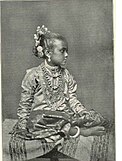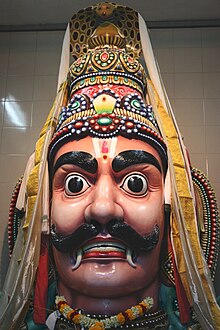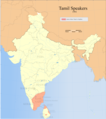Portal:Tamils
The Tamils portal
The Tamils (/ˈtæmɪlz, ˈtɑː-/ TAM-ilz, TAHM-), also known as the Tamilar, are a Dravidian ethnolinguistic group who natively speak the Tamil language and trace their ancestry mainly to the southern part of the Indian subcontinent. The Tamil language is one of the longest-surviving classical languages, with over two thousand years of written history, dating back to the Sangam period (between 300 BCE and 300 CE). Tamils constitute about 5.7% of the Indian population and form the majority in the South Indian state of Tamil Nadu and the union territory of Puducherry. They also form significant proportion of the population in Sri Lanka (15.3%), Malaysia (7%) and Singapore (5%). Tamils have migrated world-wide since the 19th century CE and a significant population exists in South Africa, Mauritius, Fiji, as well as other regions such as the Southeast Asia, Middle East, Caribbean and parts of the Western World.
Archaeological evidence from Tamil Nadu indicates a continuous history of human occupation for more than 3,800 years. In the Sangam period, Tamilakam was ruled by the Three Crowned Kings of the Cheras, Cholas and Pandyas. Smaller Velir kings and chieftains ruled certain territories and maintained relationship with the larger kingdoms. Urbanisation and mercantile activity developed along the coasts during the later Sangam period with the Tamils influencing the regional trade in the Indian Ocean region. Artifacts obtained from excavations indicate the presence of early trade relations with the Romans. The major kingdoms to rule the region later were the Pallavas (3rd–9th century CE), and the Vijayanagara Empire (14th–17th century CE). The island of Sri Lanka often saw attacks from the Indian mainland with the Cholas establishing their influence across the island and across several areas in Southeast Asia in the 10th century CE. This led to the spread of Tamil influence and contributed to the cultural Indianisation of the region. Scripts brought by Tamil traders like the Grantha and Pallava scripts, induced the development of many Southeast Asian scripts. The Jaffna Kingdom later controlled the Tamil territory in the north of the Sri Lanka from 13th to 17th century CE. European colonization began in the 17th century CE, and continued for two centuries until the middle of the 20th century. (Full article...) Selected article -Iravan also known as Iravat and Iravant, is a minor character from the Hindu epic Mahabharata. The son of Pandava prince Arjuna (one of the main heroes of the Mahabharata) and the Naga princess Ulupi, Iravan is the central deity of the cult of Kuttantavar (Kuttandavar) which is also the name commonly given to him in that tradition—and plays a major role in the sect of Draupadi. Both these sects are of Tamil origin, from a region of the country where he is worshipped as a village deity and is known as Aravan. He is also a patron god of well-known transgender communities called Alis (also Aravani in Tamil, and Hijra throughout South Asia). The Mahabharata portrays Iravan as dying a heroic death on the 8th day of the 18-day Kurukshetra War (Mahabharata war), the epic's main subject. However, the South Indian traditions have a supplementary practice of honouring Aravan's self-sacrifice to the goddess Kali to ensure her favour and the victory of the Pandavas in the war. The Kuttantavar tradition focuses on one of the three boons granted to Aravan by the god Krishna in honour of this self-sacrifice. Aravan requested that he be married before his death. Krishna satisfied this boon in his female form, Mohini. In Koovagam, Tamil Nadu, this incident is re-enacted in an 18-day festival, first by a ceremonial marriage of Aravan to Alis (hijra) and male villagers (who have taken vows to Aravan) and then by their widowhood after ritual re-enactment of Aravan's sacrifice. (Full article...)General imagesSelected biography -Navanethem "Navi" Pillay (born 23 September 1941) is a South African jurist who served as the United Nations High Commissioner for Human Rights from 2008 to 2014. A South African of Indian Tamil origin, Pillay was the first non-white woman judge of the High Court of South Africa. She has also served as a judge of the International Criminal Court and President of the International Criminal Tribunal for Rwanda. Her four-year term as High Commissioner for Human Rights began on 1 September 2008 and was extended an additional two years in 2012. In September 2014 Prince Zeid bin Ra'ad succeeded her in her position as High Commissioner for Human Rights. In April 2015, Pillay became the 16th Commissioner of the International Commission Against the Death Penalty. She is also one of the 25 leading figures on the Information and Democracy Commission launched by Reporters Without Borders. Pillay was born and raised in Durban, South Africa where she later attended the University of Natal, receiving her Bachelor of Arts in 1963 and her Bachelor of Law in 1965. After university, Pillay pursued a career as an attorney and served under criminal defense attorney N.T. Naicker, joining the legal defense against apartheid. In 1967, Pillay started her own law firm and became the first woman to do so in her home province of Natal. In 1981, Pillay applied to and attended Harvard University under the foreign exchange Harvard-South Africa Scholarship Program and earned her Master of Law. In 1988, she completed her thesis and graduated from Harvard Law School with a Doctorate of Jurisprudence. (Full article...)CategoriesTopicsTamil People Countrywide: India • Sri Lanka • Canada • Malaysia • Singapore • South Africa • England Related Ethnic Groups: Brahui • Gond • Kannadiga • Khonds • Kodava • Oraon • Malayali • Telugus • Tuluvas Related indigenous Groups: Badagas • Toda • Kuruba
See also: List of Tamil people, Tamil script, Tamil Script Code for Information Interchange Related portalsWikiProjectsThings to do
Associated WikimediaThe following Wikimedia Foundation sister projects provide more on this subject:
Discover Wikipedia using portals |



























































